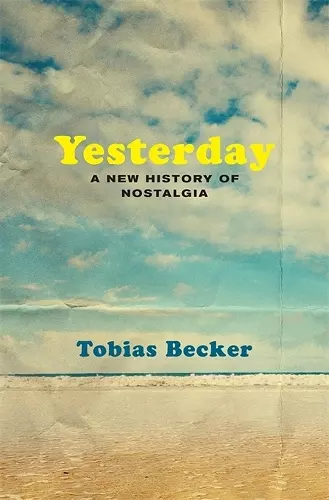Yesterday
A New History of Nostalgia
Format:Hardback
Publisher:Harvard University Press
Published:5th Dec '23
Should be back in stock very soon

A sweeping reassessment of our longing for the past, from the rise of “retro” to the rhetoric of Brexit and Trump.
Nostalgia has a bad reputation. Its critics dismiss it as mere sentimentality or, worse, a dangerous yearning for an imagined age of purity. And nostalgia is routinely blamed for trivializing the past and obscuring its ugly sides. In Yesterday, Tobias Becker offers a more nuanced and sympathetic view. Surveying the successive waves of nostalgia that swept the United States and Europe after the Second World War, he shows that longing for the past is more complex and sometimes more beneficial than it seems.
The current meaning of “nostalgia” is surprisingly recent: until the 1960s, it usually just meant homesickness, in keeping with the original Greek word. Linking popular culture to postwar politics in the United States, Great Britain, and Germany, Becker explains the shift in meaning. He also responds to arguments against nostalgia, showing its critics as often shortsighted in their own ways as they defend an idea of progress no less naïve than the wistfulness they denounce. All too often, nostalgia itself is criticized, as if its merit did not depend on which specific past one longs for.
Taking its title from one of the most popular songs of all time, and grounded in extensive research, Yesterday offers a rigorous and entertaining perspective on divisive issues in culture and politics. Whether we are revisiting, reviving, reliving, reenacting, or regressing, and whether these activities find expression in politics, music, fashion, or family history, nostalgia is inevitable. It is also powerful, not only serving to define the past but also orienting us toward the future we will create.
Despite the scorn that electoral politics may profess toward nostalgia, we practice it culturally all the time. Yesterday takes us through endless artistic revivals throughout the past half century, a period during which, as technology frog-marched us into the future, we kept a constant backward glance. -- Thomas Mallon * New Yorker *
[Yesterday] begins by charting the evolution of the concept of nostalgia, from its genesis as a medical diagnosis related to homesickness to a more abstract yearning for a rosier past to one of its many current usages, as an insult levied at anyone believed to be an opponent of progress. But by the end, Yesterday stands as a profound statement about how humans exist in time and live with the past. -- Joe Keohane * Boston Globe *
Offers an insightful and erudite deflation of nostalgia in popular culture. -- Andrew Stark * Wall Street Journal *
Becker uncovers…[nostalgia] for us in black and white, like a photo negative: not the thing itself—emotion, disease, style, or whatever it may be—but rather a sprawling ‘nostalgia discourse,’ or what is said about nostalgia. -- Thomas Dodman * American Historical Review *
The range of social, political and cultural phenomena covered is impressive and the author’s reconstructions of them absorbing. -- Scott McLemee * Inside Higher Education *
As concise and readable a study of nostalgia as one is likely to find and never fails to stimulate. -- Daniel Woolf * Marginalia *
An elegant, original, enjoyable, and important investigation of the concept of nostalgia and its power. From Paul McCartney’s ‘Yesterday’ to Dua Lipa’s ‘Future Nostalgia,’ Becker shows that the ‘problem’ with nostalgia has never been the peculiar ways it engages with the past. Instead, it is the way nostalgia contests assumptions about progress. After Yesterday, nostalgia really isn’t what it used to be. -- Ethan Kleinberg, Wesleyan University
Sha Na Na performed ‘At the Hop’ at Woodstock, six months to the day after the inauguration of the new law-and-order president, Richard Nixon. In his wide-ranging yet incisive book, Tobias Becker explains how two such disparate events could seem to belong to a single history of ‘nostalgia.’ -- Peter Fritzsche, University of Illinois
With nostalgia seemingly everywhere these days, this history of the concept since the mid-twentieth century hits the spot. Its exploration of pop culture is particularly fascinating: refuting critics who see retro revivals as signs of cultural stagnation, Becker shows that nostalgia has been a source of creative inspiration since the 1960s. -- Julia Sneeringer, Queens College and the CUNY Graduate Center
Western cultural critics have been lamenting our loss of optimism and our obsession with the past ever since the 1970s. Why? In his lucid history of arguments about nostalgia, Tobias Becker reveals their unacknowledged clinging to the idea of progress, an idea we seem unable to overcome. -- Philipp Felsch, Humboldt University of Berlin
ISBN: 9780674251755
Dimensions: 235mm x 156mm x 32mm
Weight: 680g
344 pages